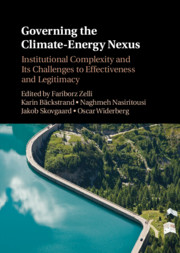
Combating climate change and transitioning to fossil-free energy systems are two central planetary challenges humanity faces today
Combating climate change and transitioning to fossil-free energy systems are two central planetary challenges humanity faces today. The two challenges strongly overlap, both in their substance and in the political choices we have to address them. As a consequence, a plethora of international institutions – public, private, and hybrid ones – fall right into this overlap. They seek to regulate the complex linkages between climate change and global energy systems.
The highly complex and fragmented nature of this climate-energy governance ‘nexus’ confronts us with questions that need timely responses. How coherent is this governance nexus – in terms of the memberships, functions, core norms and interactions across its numerous institutions? How have states, international organizations, and other actors responded to this complexity when they tackle coherence and governance gaps? How does institutional complexity affect the legitimacy and effectiveness of individual institutions and the governance of the climate-energy nexus as a whole? Or, to concentrate these concerns into one question: to which degree do the many governance efforts on climate change and energy transition today add up to a coherent global framework?
These pertinent questions are addressed in the book Governing the Climate-Energy Nexus Institutional Complexity and Its Challenges to Effectiveness and Legitimacy. The book develops four evaluative themes – coherence, management, legitimacy and effectiveness – that we analyzed with a novel analytical framework for three policy fields in the climate-energy nexus: renewable energy, fossil fuel subsidy reform and carbon pricing. Through our case studies and a mixed method approach, the book makes theoretical, methodological and empirical contributions to the study of the complex institutional landscape of global climate and energy governance.
In terms of coherence and management, we found that the three fields we selected are characterized by cross-institutional coordination, rather than competition or outright harmony. Regarding perceptions of legitimacy, our results show that the specializations and occupational backgrounds of different stakeholders lead to considerable variations in their opinions of institutions. For effectiveness, we found that institutional complexity in the nexus plays both a supportive and a hindering role across all three cases. Disadvantages include, for instance, duplication of work, conflicting messages, and competition, while one advantage is the existence of more opportunities and venues to include a broader spectrum of actors and interests.
Based on our findings, we developed a series of policy recommendations. They include:
Finally, for a future research agenda on the governance of the climate-energy nexus, we suggest to:

Latest Comments
Have your say!